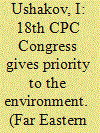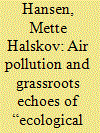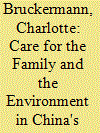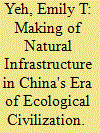| Srl | Item |
| 1 |
ID:
124997


|
|
|
|
|
| Publication |
2013.
|
| Summary/Abstract |
The author gives a close-up view of the environment in China and looks at the reasons that impelled the country's leadership to put the environment on the list of key issues for discussion at the 18th CPC Congress. He also surveys where accents are placed in environment-related congress documents.
|
|
|
|
|
|
|
|
|
|
|
|
|
|
|
|
| 2 |
ID:
159836


|
|
|
|
|
| Summary/Abstract |
This article places the study of rural environmental activism in the wider context of the Chinese government's promotion of Ecological Civilization (shengtai wenming 生态文明). Ecological Civilization is, we argue, a top-down imaginary of China's future that opens up space for environmental agency while setting authoritative standards for how to frame protests in a logic of science and social stability. The article compares how residents in a small cluster of villages in Zhejiang province dealt with different sources of air pollution over a span of ten years: how, when and why they chose to negotiate with local officials and industrial managers to prevent or reduce air pollution, and what the outcome was. We found that in addition to a consciousness of the right to protest, villagers had come to regard the ability to evoke science in negotiations with officials and industrial managers as crucial for success. We suggest that the forms of environmental activism we observed were in effect “containable protests” that befit the state-initiated national imaginary of an ecologically civilized world.
|
|
|
|
|
|
|
|
|
|
|
|
|
|
|
|
| 3 |
ID:
192178


|
|
|
|
|
| Summary/Abstract |
In the “coal province” of Shanxi, residents grapple with tensions between caring for their families and caring about their environment. In creating ethical pathways through care, residents must navigate the paradox of livelihoods dependent on forms of development that endanger lives and pollute environments. This dilemma has crystallized over time, as the personal and particular demands of the present have become enmeshed with long-standing concerns over environmental degradation. Rather than characterizing family care as concrete and environmental care as abstract, acts of care in Shanxi link the reproductive crisis of the family with the reproductive crisis of the environment: the article presents instances under which the attention, empathy and recognition of care for concrete others are scaled up to the levels of ecology and planetary crisis.
|
|
|
|
|
|
|
|
|
|
|
|
|
|
|
|
| 4 |
ID:
192623


|
|
|
|
|
| Summary/Abstract |
Campaign-style environmental enforcement that involves the destruction of infrastructure has become increasingly common. Scholars have theorized such crackdowns as a form of bureaucratic control. These explanations are compelling, yet incomplete. This paper adopts an infrastructural lens to call attention to the fact of infrastructural demolition. I argue that the reduction of existing infrastructure to rubble is a way of clearing space for other kinds of infrastructure, specifically natural infrastructure, which has become central in the pursuit of ecological civilization. The creation of natural infrastructure requires calculative tools, which work to obscure the profoundly political nature of the natural infrastructure that they create through spatial zoning, ecological functional zoning and ecological conservation red lines (ECRLs). The article then scales down to two case studies of villages in post-earthquake Sichuan that are within ECRLs and designated for the function of providing ecosystem services. In both, infrastructure within scenic areas that was previously encouraged by the state and central to village livelihoods was suddenly destroyed following ecological civilization enforcement campaigns. The arrival of natural infrastructure marks a national-scale infrastructural time that promises a new future in which village-controlled scenic areas have no part, leading to a ruination of their imagined futures.
|
|
|
|
|
|
|
|
|
|
|
|
|
|
|
|